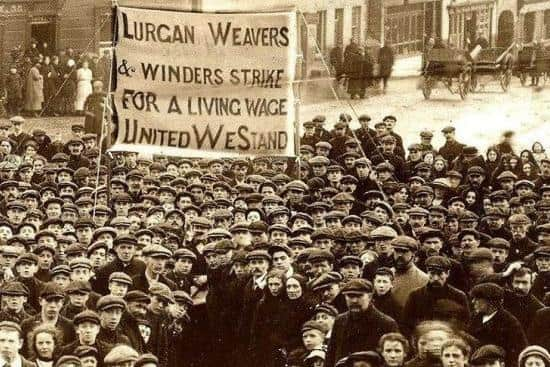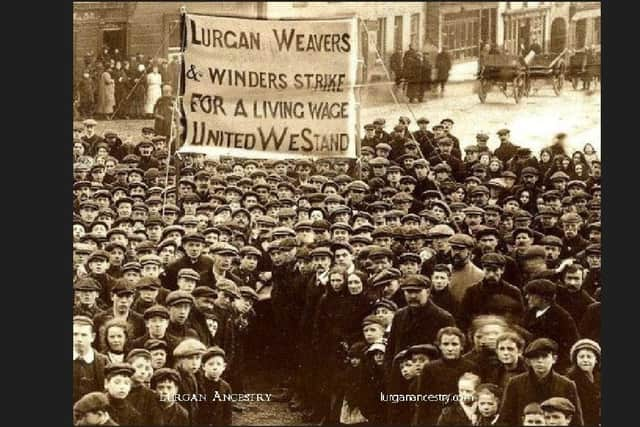Talk on 110th anniversary of the Lurgan Weavers and Winders Strike by historian Dr Barry Sheppard
and live on Freeview channel 276
Dr Sheppard, who is from Lurgan, will be speaking at The Jethro Centre on the 1913 Lurgan Weavers’ and Winders’ Strike next Tuesday (May 9).
-


-
The eminent historian revealed: “110 years ago the power looms in Lurgan’s major linen producers fell silent. Workers from across the town took to the streets to protest against a cost of living crisis which had caused many to fall below the breadline. In late December 1912, the Weavers and Winders of Lurgan companies such as Johnston & Allen and The Ulster Weaving Company, balloted for strike action over better pay and conditions. In a case which echoes labour disputes of today, the Weavers’ and Winders’ from across the town took industrial action in January of 1913. The strike lasted for five weeks.
Advertisement
Hide AdAdvertisement
Hide Ad"During the strike demonstrations were held in Market Street and mass meetings were convened in the town hall and the nearby Carnegie Street Picture House. Trade union officials from various parts of Ireland and England travelled to Lurgan to express solidarity with the striking workers. Hundreds of pounds were raised by trade union bodies and the public, while Labour MPs raised the matter at Westminster.
"The Lurgan Weavers’ and Winders’ strike of 1913 has largely been forgotten as it occurred in the shadow of other major labour disputes such as the 1913 Dublin Lockout, and the Home Rule crisis which grabbed the lion’s share of the headlines.


"Nevertheless, many labour activists and journalists, particularly in Britain, championed the workers who came from across the two main communities in the town,” revealed Dr Sheppard.
"The Daily Citizen, the organ of the British Labour party, described the dispute as one of the big political battles of the day. It stated: ‘While Sir Edward Carson and his lieutenants are promising comic-opera revolution in Ulster, a very real and strenuous war is being waged on behalf of some of the most downtrodden serfs of modern industry’.”
Advertisement
Hide AdAdvertisement
Hide AdDr Barry Sheppard will deliver a talk on the 1913 Lurgan Weavers’ and Winders’ Strike this Tuesday, 9th May, at 7:30pm in the Jethro Centre, 6 Flush Place, as part of the annual Craigavon Historical Society’s programme of events. Free admission, all welcome.
Craigavon Historical Society is a cross-community group formed in 1967 with the objective of preserving community history as land between Lurgan and Portadown was being cleared to develop the ‘New City’ of Craigavon.
The Society’s interests cover the former borough of Craigavon including the towns of Portadown and Lurgan and the villages and rural areas surrounding them, each with their own rich history.
Recently Craigavon Historical Society recently cooperated with David Weir of Craigavon Museum Services and the children of Hart Memorial School in Portadown to produce a film about Sir Robert Hart.